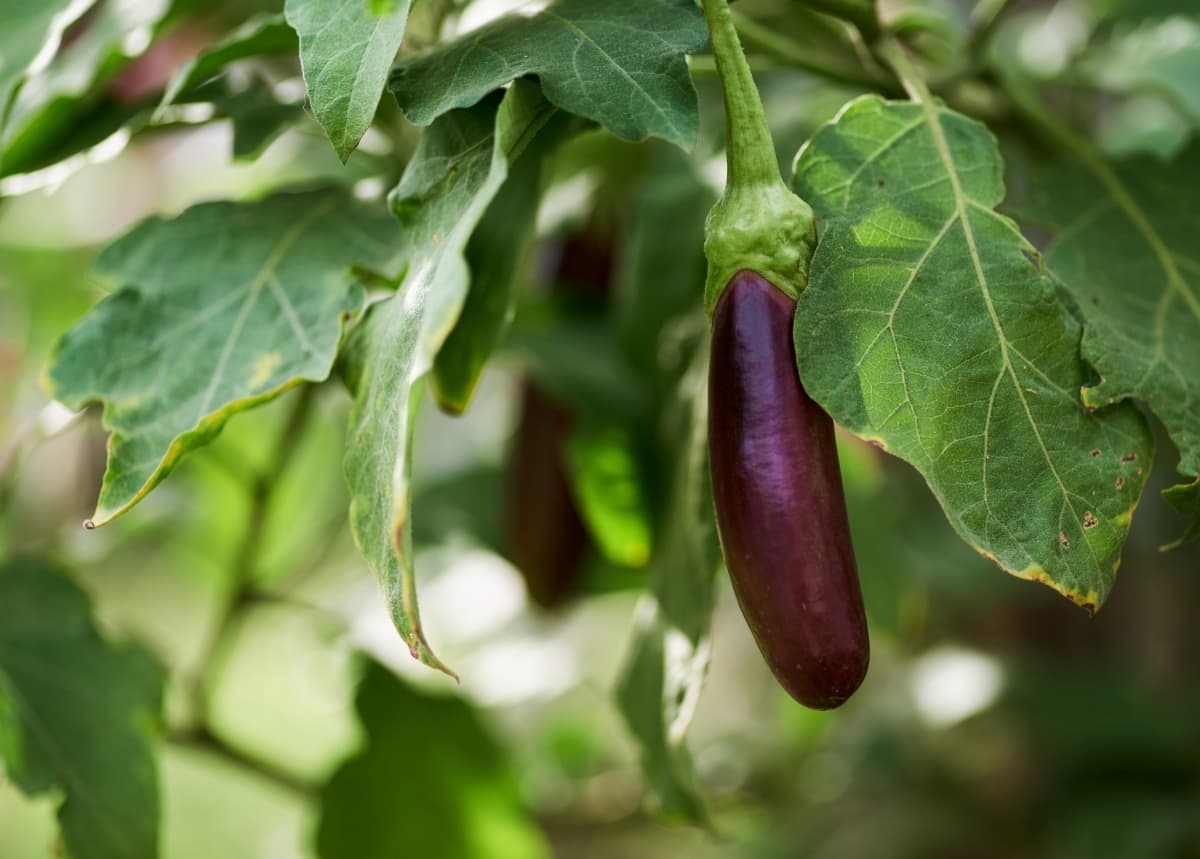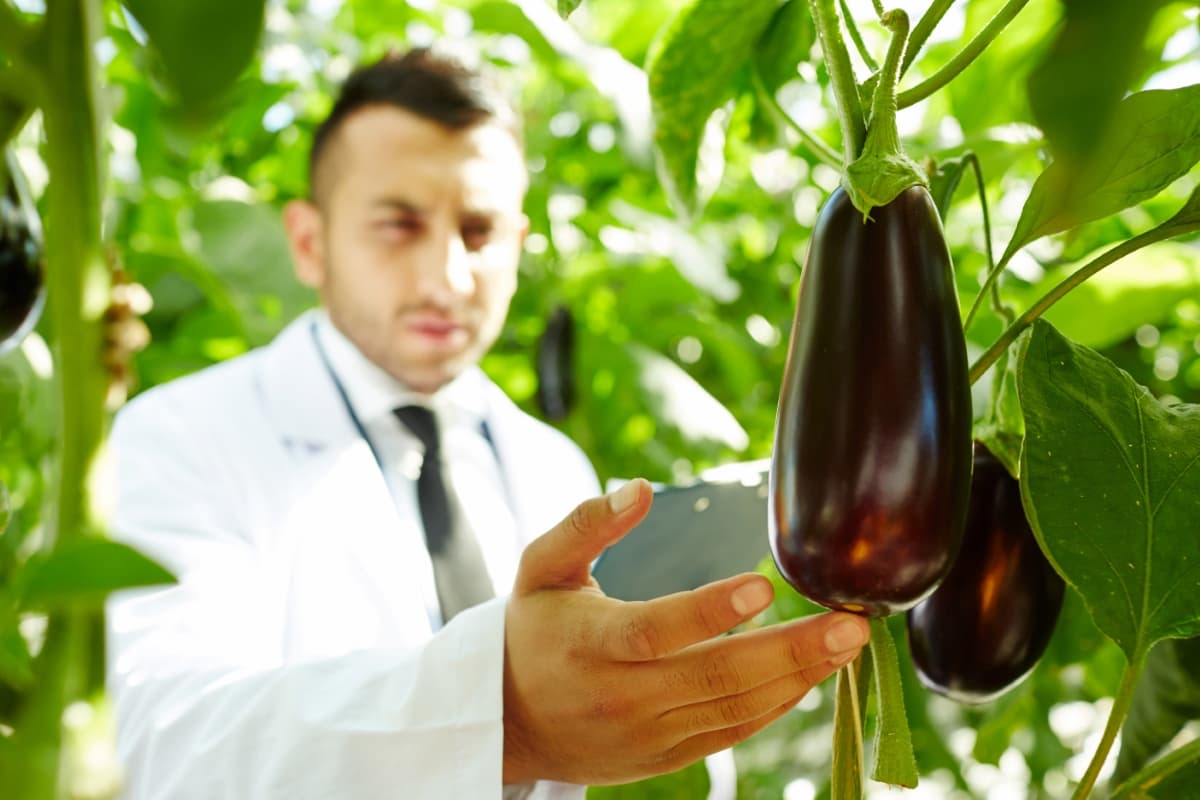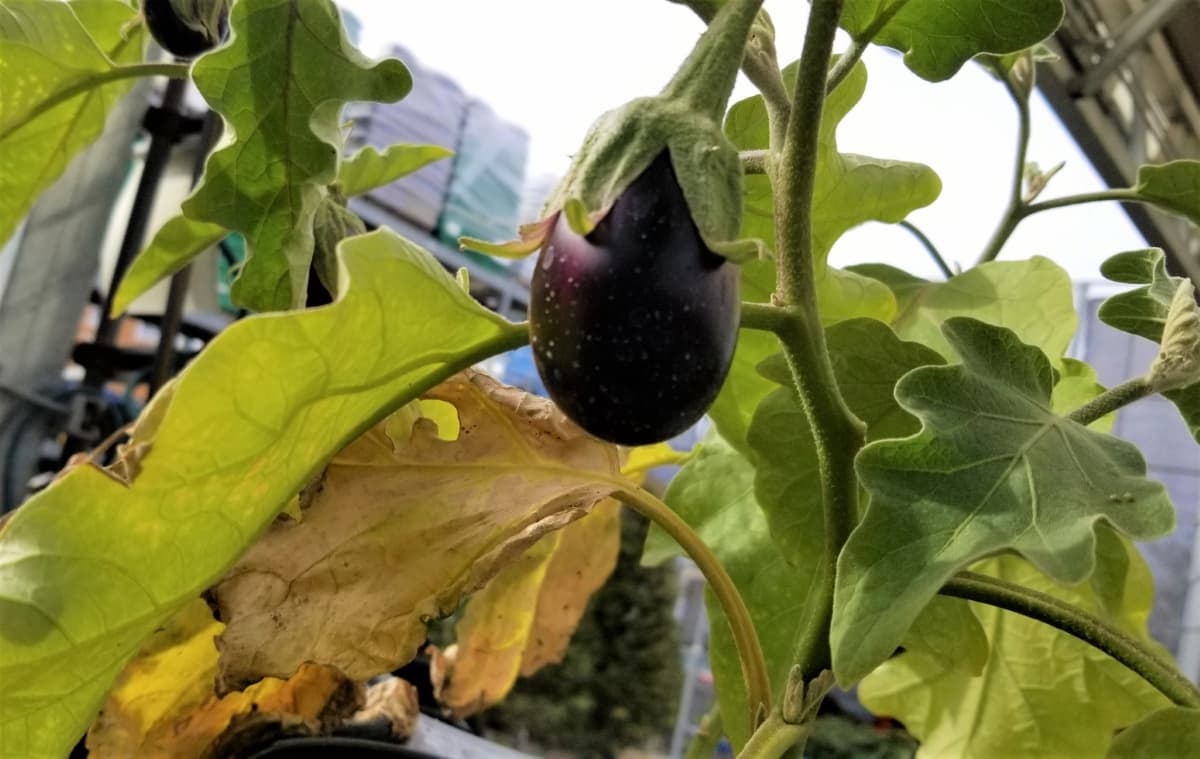Eggplants are popular in many households for their versatility and delicious taste. However, they are also prone to fungal diseases that significantly reduce yields and quality. Fungal infections in Eggplants affect the plant’s health and risk human health if consumed. Fungal diseases are a common problem for Eggplant growers.

These diseases are caused by various fungi that thrive in warm and humid conditions, often found in the summer months. Eggplants with fungal diseases can show symptoms such as wilting leaves, yellowing or browning of the leaves, spots on fruit and stems, and stunted growth.
One type of fungal disease is anthracnose, which causes sunken brown or black spots on the plant’s fruit. Another common fungus that affects Eggplants is powdery mildew. Botrytis blight is another fungal disease that causes gray-brown mold to grow on flowers, fruits, and foliage. Verticillium wilt is also a serious issue where plants infected may have discolored streaks inside their stem tissues, causing them to dry up from water deficits.
How to Prevent Fungal Diseases in Eggplants
Effective Methods to Prevent Fungal Diseases in Eggplants
Fungal diseases are one of the most common threats to Eggplant cultivation. However, there are several effective methods that you can employ to prevent these infections and ensure healthy yields. It is essential to maintain proper hygiene practices in your garden. Ensure you regularly remove any plant debris or fallen leaves from around your plants.
These offer a conducive environment for fungal pathogens and should not be left around. Avoid overwatering your Eggplants, which creates moist conditions promoting fungi growth. Rather than watering them frequently, opt for deep watering at longer intervals. Consider using organic fungicides such as neem oil and copper sulfate to treat any early signs of infection on your Eggplants.
These products work effectively without harming beneficial insects or pollinators in your garden. In addition to these methods, crop rotation is an effective way of preventing fungal infections in Eggplants. By rotating crops each season, you reduce the likelihood of soil-borne pathogens infecting new plants.
Key Strategies for Avoiding Fungal Infections in Eggplants
Eggplants are a popular and nutritious vegetable that can be found in many gardens around the world. However, if not managed effectively, fungal diseases can quickly ruin your Eggplant crop. Keep your garden clean and debris-free to reduce the risk of disease spreading among plants. Over-watering or under-watering can lead to stress on the plant, making it more susceptible to infection. Ensure you have proper drainage and water regularly but do not overdo it.
Planting Eggplants in the same spot year after year increases the likelihood of soil-borne diseases taking hold. Applying fungicides is an effective way of controlling fungal infections before they take hold. Use them sparingly and according to package instructions, as overuse may cause resistance issues. Regular monitoring will help you catch any signs of disease before they become unmanageable. By implementing these strategies, you can avoid the most common fungal infections affecting Eggplants while ensuring healthy crop yield every season.
Natural Ways to Prevent Fungal Diseases in Eggplants
There are several natural ways to prevent fungal diseases in Eggplants, which can help you avoid using harmful chemicals on your plants. One effective method is crop rotation. By rotating your crops yearly and avoiding planting Eggplants in the same spot, you’ll reduce the risk of soil-borne fungi infecting your plants.
In case you missed it: Eggplant Companion Planting: Benefits, Find Out Which Are The Best Companion Plants and Which Are Not

Another great way to prevent fungal infections is by using beneficial insects such as ladybugs and lacewings. These insects eat harmful pests and help control fungal growth by keeping the environment balanced. Proper watering techniques are essential for healthy Eggplants and for preventing fungus growth. Avoid overwatering, as that can cause root rot and other fungal issues. Instead, water deeply once a week or whenever necessary based on weather conditions.
Mulching around your Eggplant plants with organic materials like straw or wood chips helps keep moisture levels consistent while suppressing weed growth. This mulch layer provides insulation against temperature extremes, crucial for maintaining healthy plant roots. Pruning infected leaves early can stop the further spread of disease throughout the plant and even other nearby plants in some cases. Always sanitize tools after use to effectively prune affected areas without spreading spores elsewhere in your garden.
Essential Steps for Maintaining Healthy Eggplants and Preventing Fungal Issues
Ensure proper soil drainage by avoiding overwatering the plants. Standing water can attract fungi that thrive in moist conditions. Another critical step is crop rotation. This process helps prevent the build-up of harmful pathogens in the soil by planting different crops each year in the same area. Additionally, remove any diseased plant material immediately to avoid spreading fungal spores.
Using organic fertilizers like compost or natural sources such as bone meal can also help improve soil health and reduce your reliance on chemical-based fertilizers that might harm beneficial microbes present in the soil. Good garden hygiene habits are crucial when working with Eggplants or other susceptible crops. Keep your garden tools clean and sanitized regularly, especially after handling infected plants.
Consider using fungicides as a last resort to control infections, as they may adversely affect beneficial insects around your garden. Instead of relying entirely on chemicals for disease prevention, try adopting an integrated pest management approach that emphasizes preventive measures such as regular monitoring for signs of infestation and early detection before symptoms worsen.
Disease-Resistant Eggplant Varieties: Enhancing Fungal Resistance in Cultivation
Planting resistant varieties whenever possible can help reduce susceptibility to certain pathogens. By being aware of these different fungal infections and following appropriate prevention strategies when growing your Eggplants, you’ll ensure healthy yields come harvest time. One such variety is the Black Beauty Eggplant.
This cultivar has proven resistant to many common fungal diseases that plague other Eggplants. Additionally, it produces high yields, making it an attractive option for commercial growers. Another disease-resistant variety is the Florida High Bush Eggplant. This type of Eggplant boasts resistance against many fungal pathogens, including Verticillium wilt and Phytophthora blight.
In case you missed it: How to Grow Eggplants/Brinjal in Greenhouse: A Step-by-Step Guide for Seed to Harvest

The Louisiana Long Green Eggplant is another example of a disease-resistant cultivar that can thrive in areas where humidity levels are high. It shows good resistance against fungal diseases like Anthracnose and Alternaria leaf spot. While these disease-resistant Eggplants do not eliminate the risk of infection, they greatly reduce it compared to non-resistance strains or hybrids.
Conclusion
Preventing fungal diseases in Eggplants is crucial for a healthy yield. These diseases reduce the quantity of Eggplant produced and decrease its quality. It can be challenging to control these diseases, especially when they have already established themselves in your garden. However, with proactive measures such as crop rotation, proper watering techniques, and fungicides, you can prevent them from occurring.
By following these tips, you will have a better chance of growing healthy and productive Eggplants while avoiding the negative impact that comes with fungal infestations. Taking action early on is essential if you suspect any signs of fungus or other harmful pests in your Eggplant crops.
- Ultimate Guide to Ossabaw Island Hog: Breeding, Raising, Diet, and Care
- Ultimate Guide to Juliana Pig: Raising Facts, Size, Diet, Care, and Lifespan
- Raising Lleyn Sheep: Disadvantages, Price, Uses, Characteristics, and Care
- Ultimate Guide to Meishan Pig: Breed Facts, Breeding, Raising, and Care
- Ultimate Guide to Teacup Pigs: Raising, Diet, Lifespan, Cost, and Care
- Guide to Raising Poll Dorset Sheep: Facts, Profile, Characteristics, Uses, and Care
- Ultimate Guide to Bighorn Sheep: Characteristics, Diet, Lifespan, Breeding, and Lifecycle
- Ultimate Guide to Raising Katahdin Sheep: Farming Facts, Breed Profile, Uses, and Care
- Ultimate Guide to Raising Oreo Cows: Belted Galloways Farming Facts, Profile, Uses, and Care